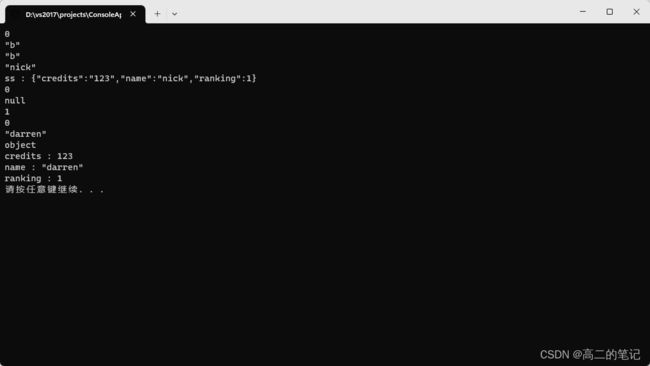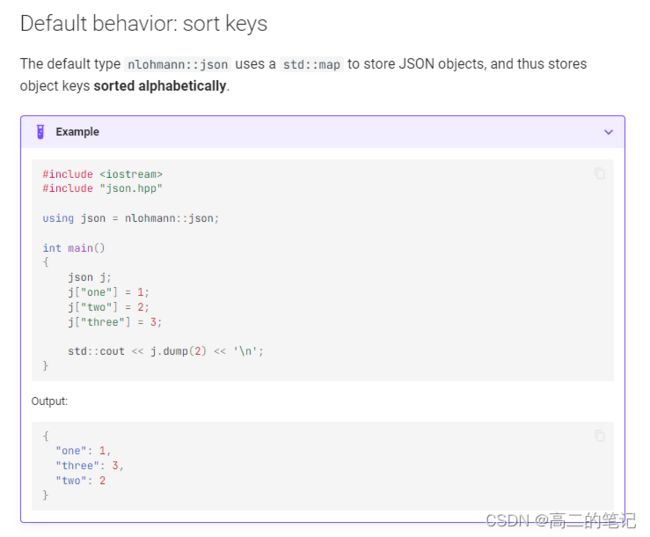- Java与Elasticsearch集成详解,以及使用指南
qzw1210
javaelasticsearchjenkins
Java与Elasticsearch集成详解1.环境配置首先,你需要在Maven项目中添加ElasticsearchJava客户端依赖:co.elastic.clientselasticsearch-java8.10.0com.fasterxml.jackson.corejackson-databind2.15.2jakarta.jsonjakarta.json-api2.1.12.客户端初始化E
- 深入理解C++内存管理机制
qzw1210
C++c++学习笔记
侯捷C++系列课程学习笔记:深入理解C++内存管理机制在侯捷老师的C++系列课程中,内存管理是一个极其重要且深刻的主题。通过对这部分内容的学习,我对C++的内存管理机制有了更深入的理解,特别是关于new/delete操作符、内存池设计以及智能指针的应用。一、C++内存分配的层次结构侯捷老师在课程中清晰地阐述了C++内存分配的层次结构,这让我对整个内存管理体系有了全局的认识:最底层:操作系统提供的内
- Hive SQL 精进系列: JSON_TUPLE 快速提取多键值
进一步有进一步的欢喜
HiveSQL精进系列hivesqlhadoop
目录一、引言二、json_tuple函数基础2.1基本语法参数解释返回值简单示例三、应用场景3.1数据提取与分析3.2数据集成与转换3.3复杂JSON数据处理四、json_tuple、get_json_object和from_json的对比4.1功能特点4.2语法和使用复杂度4.3性能表现4.4示例对比使用json_tuple使用get_json_object使用from_json五、使用注意事项
- 信息学奥赛一本通C++语言-----1119:矩阵交换行
宝祺祺吖
c++算法
【题目描述】给定一个5×55×5的矩阵(数学上,一个r×cr×c的矩阵是一个由rr行cc列元素排列成的矩形阵列),将第nn行和第mm行交换,输出交换后的结果。【输入】输入共66行,前55行为矩阵的每一行元素,元素与元素之间以一个空格分开。第66行包含两个整数m、nm、n,以一个空格分开(1≤m,n≤5)(1≤m,n≤5)。【输出】输出交换之后的矩阵,矩阵的每一行元素占一行,元素之间以一个空格分开。
- Scala语言的硬件驱动
花韵婷
包罗万象golang开发语言后端
使用Scala语言进行硬件驱动开发引言随着计算机技术的快速发展,硬件设备的交互和控制在现代应用中显得尤为重要。大多数硬件驱动程序都用C或C++编写,但随着Scala语言的流行及其在数据处理和并发编程中的优势,越来越多的开发者开始探讨利用Scala进行硬件驱动开发的可能性。本文将深入探讨Scala语言在硬件驱动开发中的应用、优势、以及一些实际案例。什么是硬件驱动硬件驱动(DeviceDriver)是
- 基于Mosquitto和Paho,在C++中使用MQTT
牛魔王的小怪兽
MQTTc++开发语言网络协议
基于Mosquitto和Paho,使用C++进行MQTT相关应用的开发文章目录基于Mosquitto和Paho,使用C++进行MQTT相关应用的开发1.什么是MQTT2.MQTT的应用场景3.基于Paho,在C++中使用MQTT3.1.下载Paho库3.2.发布消息的代码示例3.3.订阅消息的代码示例3.4.综合示例3.4.1.LinuxC++发布端代码3.4.2.LinuxC++订阅端代码4.基
- 【HarmonyOS NEXT 】应用开发:使用@ohos.net.webSocket发送webSocket
纳米小川
HarmonyOSharmonyos.netwebsocket
@ohos.net.webSocket模块可以建立WebSocket连接,实现与服务器之间的实时双向通信。WebSocket提供了一种低延迟的通信方式,非常适合实时应用,如聊天应用、在线游戏等。下面是使用@ohos.net.webSocket模块建立WebSocket连接的步骤:1、添加权限确保在config.json文件中添加了网络访问权限:{"name":"com.example.myappl
- 《C++ primer》第六章
鱼不如渔
C++Primer第五版——读书笔记c++开发语言
一、函数基础函数的定义包括:返回类型、函数名、形参列表、函数体/*编写函数*/intfact(intval){intret=1;while(val>1)ret*=val--;returnret;}/*调用函数*/intmain(void){intj=fact(5);cout#includeusingnamespacestd;intmain(intargc,char*argv[]){//检查是否提供
- C++泛型编程
鱼不如渔
C++Primer第五版——读书笔记c++开发语言
感谢哔哩哔哩UP”开发者LaoJ“,以下是听课记录~模板是C++实现泛型编程的手段,同一段代码逻辑可以接受多个类型的参数无论是函数模板还是类模板,在编码后,需要分文件时,将其声明和定义放进.hpp文件中。不要将声明放.h,定义放.cpp,会报错一、函数模板对于函数模板,使用不同的类型对其进行实例化时,会生成多个不同的函数当没有调用函数模板时,不会被实例化(延迟实例化)1.1、接受类型参数#incl
- uni-app移动端应用开发底部安全区域适配
向凡而生
uni-app前端
针对IOS机型,底部安全区域是系统动态计算的,所以我们也需要动态获取底部安全区域来适配在uniapp的manifest.json,打开源码视图,对需要适配的页面添加如下配置"styles":{"safeArea":{"bottom":"auto"}}如果使用CSS。一种常见的方法是使用padding-bottom或margin-bottom属性,并使用vh-unit单位来确保底部安全距离不受屏幕尺
- 【C++】继承
月亮有痕迹诶
C++c++开发语言
目录前言一、继承的概念及定义1.1继承的概念1.2继承的定义1.2.1定义格式1.2.2继承关系和访问限定符1.2.3继承基类成员访问方式的变化二、基类和派生类对象复制转换三、继承中的作用域四、派生类的默认成员函数五、继承与友元六、继承与静态成员七、复杂的菱形继承及菱形虚拟继承八、继承的总结和反思总结前言随着面向对象编程(OOP)在现代软件开发中的广泛应用,继承作为其核心机制之一,成为了代码复用和
- Qt 设置窗体透明
Qt开发老杰
qt数据库开发语言c++c语言
一、前言在音频开发中,窗体多半为半透明、圆角窗体,如下为Qt5.5VS2013实现半透明方法总结。二、半透明方法设置1、窗体及子控件都设置为半透明1)setWindowOpacity(0.8);//参数范围为0-1.0,通过QSlider控件做成透明度控制条本文福利,莬费领取Qt开发学习资料包、技术视频,内容包括(C++语言基础,Qt编程入门,QT信号与槽机制,QT界面开发-图像绘制,QT网络,Q
- 从零开始探索C++游戏开发:性能、控制与无限可能
南玖yy
C++游戏开发c
一、为何选择C++开发游戏?在虚幻引擎5渲染的次世代画面背后,在《巫师3》的庞大开放世界中,在《毁灭战士》的丝滑60帧战斗里,C++始终扮演着核心技术角色。这门诞生于1983年的语言,至今仍占据着游戏引擎开发语言使用率榜首(根据2023年GameDev调查数据)。其核心竞争力体现在:硬件级控制:手动内存管理允许精确控制资源分配,这对需要管理数百万多边形和4K纹理的3A游戏至关重要零成本抽象:模板元
- rapidocr-onnxruntime库及在open-webui上传PDF 图像处理 (使用 OCR)应用
原野AI
大模型部署pdfocr深度学习open-webui
背景rapidocr-onnxruntime是一个跨平台的OCR库,基于ONNXRuntime推理框架。目前已知运行速度最快、支持最广,完全开源免费并支持离线快速部署的多平台多语言OCR。缘起:百度paddle工程化不是太好,为了方便大家在各种端上进行ocr推理,我们将它转换为onnx格式,使用Python/C++/Java/Swift/C#将它移植到各个平台。名称来源:轻快好省并智能。基于深度学
- C++面向对象三大特性
CodeCuriosity
C++c++开发语言
一、封装封装是将数据和操作数据的函数捆绑在一起形成类,通过访问控制限定符(如private、protected、public)隐藏对象的内部细节,仅对外提供必要接口,以此增强代码的安全性和可维护性。#includeclassBankAccount{private:doublebalance;//私有成员变量,外部无法直接访问public://构造函数,用于初始化账户余额BankAccount(do
- c++调用python代码,使用gpu
AI改变视界
c++python开发语言
c++调用python,使用gpu加速1、首先要配置cuda和cudnn的环境1、cmd窗口下nvidia-smi,查看电脑可以支持的最高cuda版本。如果nvidia-smi报错,那么需要去配置一下环境,网上有类似案例。或者通过NVIDIA控制面板/系统信息/组件里查看cuda_xxxx.dll,上面有版本号。2、保证安装的cuda版本要小于电脑支持的版本号。我电脑最大支持cuda11,但是安装
- 如何编写vscode的配置文件c_cpp_properties.json
小秋slam实战
从零开始学SLAMvscode
文章目录配置`c_cpp_properties.json`文件改变VScode中空格长度VSCode中C/C++无法跳转到定义c_cpp_properties.json安装插件配置c_cpp_properties.json文件假设你已经安装了GCC和G++编译器,{"configurations":[{"name":"Linux","includePath":
- C++学习:类和对象(一)
随便取个六字
c++
一、面向过程与面向对象编程1.什么是面向过程编程?面向过程编程(ProceduralProgramming)是一种以过程(或函数)为中心的编程范式。程序被视为一系列按顺序执行的步骤,主要通过函数对数据进行操作特点:执行顺序明确:程序按照代码书写的顺序执行侧重算法:重视具体的操作步骤和实现流程代码重用性低:相似的功能需要重复编写代码代码示例:计算数组元素的平均值#includeusingnamesp
- 【C++基础八】类和对象—末(初始化列表、友元和匿名对象)
Pacify_The_North
C++c++开发语言windowsvisualstudio
【C++基础八】类和对象—末1.初始化列表1.1初始化列表的使用1.2初始化列表的细节2.static成员3.友元3.1友元函数3.2友元类4.类的匿名对象5.explicit1.初始化列表构造函数中,为一个成员赋值,只能说对此成员赋初始值,不能称之为初始化,初始化列表才是真正初始化成员变量的地方1.1初始化列表的使用例:classDate{public:Date(intyear,intmonth
- 数据结构(C\C++)——算法复杂度
飞鸟吟
数据结构数据结构c语言c++
算法复杂度前言1.数据结构前言1.1数据结构1.2算法1.3如何学好数据结构和算法2.算法效率2.1复杂度的概念2.2复杂度的重要性3.时间复杂度3.1定义3.2大O的渐进表示法3.3时间复杂度计算示例3.3.1示例13.3.2示例23.3.3示例33.3.4示例43.3.5示例5冒泡排序时间复杂度3.3.6示例63.3.7示例74.空间复杂度4.1空间复杂度计算示例4.1.1示例14.1.2示例
- 每日总结3.13
labubu12
c语言
第十五届蓝桥杯c++省赛大学B组1.小球反弹问题(√)(镜像扩展空间,没有碰撞反弹,小球一直前进,到达出发点镜像后的点)#includeusingnamespacestd;intmain(){longlongx=343720,y=233333;longlongdx=15,dy=17;longlongt=1;while(1){if((t*dx)%x==0&&(t*dy)%y==0){break;}t
- 《侯捷 C++ 系列精品课学习之旅:知识盛宴与成长感悟》
一朵忧伤的蔷薇
c++学习jvm
一、初遇C++:基础与语法的探索课程伊始,侯捷老师以深入浅出的方式,为我们讲解了C++的基础语法。从变量、数据类型到控制结构,每一个知识点都被剖析得细致入微。我印象尤为深刻的是老师对指针的讲解。指针作为C++的核心概念之一,向来以其抽象和复杂而让初学者望而却步。然而,侯老师通过生动形象的比喻和丰富的示例,将指针的原理和应用讲解得通俗易懂。他将指针比作地址,就像现实生活中的门牌号,通过它我们可以准确
- VIM使用小技巧
ka__ka__
工具技巧vim
VIM的优势如果做LinuxC/C++开发,经常ssh到Linux服务器编辑各种文件,那么熟练使用VIM绝对可以提高工作效率。VIM的高效体现在多模式,可以很方便快速的对文件进行各种编辑修改,而这恰恰是在软件开发中经常遇到的场景。VIM流行这么多年,很多操作都是经过多年沉淀下来的高效操作,熟练的VIM操作可以让编辑与思维尽可能同步,快速的反复修改,把代码写成想要的样子。并且,在Linux上很多的操
- 程序编译生成的文件
石油人单挑所有
Linux系统编程算法
目录.i文件.s文件.o文件总结在C++编程中,.i、.s和.o文件是编译过程中生成的不同阶段的文件,它们代表不同的含义:.i文件全称:预处理后的文件(IntermediateFile)。含义:.i文件是源代码文件(如.cpp文件)经过预处理阶段生成的文件。预处理阶段主要处理源代码中的预处理指令,如#include、#define等。.i文件包含了经过预处理后的代码,即所有头文件被展开,宏被替换,
- WebSocket JAVA客户端和服务端 传送文件DEMO
易天法地
JAVAwebsocketjava网络
Server端WebSocketServer.java用于启动Server服务importcn.hutool.core.bean.BeanUtil;importcn.hutool.json.JSONUtil;importorg.slf4j.Logger;importorg.slf4j.LoggerFactory;importorg.springframework.stereotype.Compon
- uniCloud 外部系统联登 注册功能 C# 完整示例
易天法地
c#开发语言uniappunicloud
APP端this.$http.post(`/uniCloudRegister`,{clientInfo:JSON.stringify(uni.getSystemInfoSync())}).then(res=>{uni.stopPullDownRefresh()uni.hideNavigationBarLoading()console.info(res)}).catch(err=>{console.
- 高级线程管理_第九章_《C++并发编程实战》笔记
郭涤生
#并发线程c/c++c++并发编程
高级线程管理1.线程池(ThreadPool)1.1线程池结构要素1.2线程池实现步骤2.线程中断(InterruptibleThreads)2.1中断机制实现多选题多选题答案设计题目设计题目答案1.线程池(ThreadPool)核心目的:避免频繁创建/销毁线程,复用固定数量的线程处理任务队列。1.1线程池结构要素任务队列:存储待执行的任务(函数对象)工作线程集合:执行任务的线程同步机制:互斥锁(
- Visual Studio Code (VS Code) – C/C++ 入门
——基于VisualStudioCode官方文档的全面的、具体的入门级教程请移步至https://blog.csdn.net/m0_73287396/article/details/128635316
- Java:AI 浪潮中的隐形支柱 —— 探秘 Java 在人工智能领域的独特地位
琢磨先生David
人工智能
引言在人工智能技术席卷全球的今天,当人们谈论AI开发时,Python、R语言、C++等工具总是最先被提及。然而在这个充满创新的领域,有一个"老兵"正悄然发挥着不可替代的作用——自1995年诞生至今的Java语言,凭借其独特的工程化基因,正在构建起AI世界的底层基础设施。本文将揭示Java如何在大数据、机器学习、企业级AI系统等领域持续创造价值。一、Java的AI基因解码跨平台优势的现代意义"一次编
- C++程序设计语言笔记——抽象机制:泛型程序设计
钺不言
C++笔记c++笔记开发语言经验分享
0模板可传递实参类型而不丢失信息。在C++中,模板传递实参类型时保留所有类型信息的关键在于正确使用引用和转发机制。以下是几种常见场景的解决方案:1.使用万能引用(UniversalReference)和完美转发通过T&&捕获任意类型的引用(左值/右值),结合std::forward保留原始类型信息:templatevoidwrapper(T&&arg){//完美转发,保留所有类型信息(包括cons
- java观察者模式
3213213333332132
java设计模式游戏观察者模式
观察者模式——顾名思义,就是一个对象观察另一个对象,当被观察的对象发生变化时,观察者也会跟着变化。
在日常中,我们配java环境变量时,设置一个JAVAHOME变量,这就是被观察者,使用了JAVAHOME变量的对象都是观察者,一旦JAVAHOME的路径改动,其他的也会跟着改动。
这样的例子很多,我想用小时候玩的老鹰捉小鸡游戏来简单的描绘观察者模式。
老鹰会变成观察者,母鸡和小鸡是
- TFS RESTful API 模拟上传测试
ronin47
TFS RESTful API 模拟上传测试。
细节参看这里:https://github.com/alibaba/nginx-tfs/blob/master/TFS_RESTful_API.markdown
模拟POST上传一个图片:
curl --data-binary @/opt/tfs.png http
- PHP常用设计模式单例, 工厂, 观察者, 责任链, 装饰, 策略,适配,桥接模式
dcj3sjt126com
设计模式PHP
// 多态, 在JAVA中是这样用的, 其实在PHP当中可以自然消除, 因为参数是动态的, 你传什么过来都可以, 不限制类型, 直接调用类的方法
abstract class Tiger {
public abstract function climb();
}
class XTiger extends Tiger {
public function climb()
- hibernate
171815164
Hibernate
main,save
Configuration conf =new Configuration().configure();
SessionFactory sf=conf.buildSessionFactory();
Session sess=sf.openSession();
Transaction tx=sess.beginTransaction();
News a=new
- Ant实例分析
g21121
ant
下面是一个Ant构建文件的实例,通过这个实例我们可以很清楚的理顺构建一个项目的顺序及依赖关系,从而编写出更加合理的构建文件。
下面是build.xml的代码:
<?xml version="1
- [简单]工作记录_接口返回405原因
53873039oycg
工作
最近调接口时候一直报错,错误信息是:
responseCode:405
responseMsg:Method Not Allowed
接口请求方式Post.
- 关于java.lang.ClassNotFoundException 和 java.lang.NoClassDefFoundError 的区别
程序员是怎么炼成的
真正完成类的加载工作是通过调用 defineClass来实现的;
而启动类的加载过程是通过调用 loadClass来实现的;
就是类加载器分为加载和定义
protected Class<?> findClass(String name) throws ClassNotFoundExcept
- JDBC学习笔记-JDBC详细的操作流程
aijuans
jdbc
所有的JDBC应用程序都具有下面的基本流程: 1、加载数据库驱动并建立到数据库的连接。 2、执行SQL语句。 3、处理结果。 4、从数据库断开连接释放资源。
下面我们就来仔细看一看每一个步骤:
其实按照上面所说每个阶段都可得单独拿出来写成一个独立的类方法文件。共别的应用来调用。
1、加载数据库驱动并建立到数据库的连接:
Html代码
St
- rome创建rss
antonyup_2006
tomcatcmsxmlstrutsOpera
引用
1.RSS标准
RSS标准比较混乱,主要有以下3个系列
RSS 0.9x / 2.0 : RSS技术诞生于1999年的网景公司(Netscape),其发布了一个0.9版本的规范。2001年,RSS技术标准的发展工作被Userland Software公司的戴夫 温那(Dave Winer)所接手。陆续发布了0.9x的系列版本。当W3C小组发布RSS 1.0后,Dave W
- html表格和表单基础
百合不是茶
html表格表单meta锚点
第一次用html来写东西,感觉压力山大,每次看见别人发的都是比较牛逼的 再看看自己什么都还不会,
html是一种标记语言,其实很简单都是固定的格式
_----------------------------------------表格和表单
表格是html的重要组成部分,表格用在body里面的
主要用法如下;
<table>
&
- ibatis如何传入完整的sql语句
bijian1013
javasqlibatis
ibatis如何传入完整的sql语句?进一步说,String str ="select * from test_table",我想把str传入ibatis中执行,是传递整条sql语句。
解决办法:
<
- 精通Oracle10编程SQL(14)开发动态SQL
bijian1013
oracle数据库plsql
/*
*开发动态SQL
*/
--使用EXECUTE IMMEDIATE处理DDL操作
CREATE OR REPLACE PROCEDURE drop_table(table_name varchar2)
is
sql_statement varchar2(100);
begin
sql_statement:='DROP TABLE '||table_name;
- 【Linux命令】Linux工作中常用命令
bit1129
linux命令
不断的总结工作中常用的Linux命令
1.查看端口被哪个进程占用
通过这个命令可以得到占用8085端口的进程号,然后通过ps -ef|grep 进程号得到进程的详细信息
netstat -anp | grep 8085
察看进程ID对应的进程占用的端口号
netstat -anp | grep 进程ID
&
- 优秀网站和文档收集
白糖_
网站
集成 Flex, Spring, Hibernate 构建应用程序
性能测试工具-JMeter
Hmtl5-IOCN网站
Oracle精简版教程网站
鸟哥的linux私房菜
Jetty中文文档
50个jquery必备代码片段
swfobject.js检测flash版本号工具
- angular.extend
boyitech
AngularJSangular.extendAngularJS API
angular.extend 复制src对象中的属性去dst对象中. 支持多个src对象. 如果你不想改变一个对象,你可以把dst设为空对象{}: var object = angular.extend({}, object1, object2). 注意: angular.extend不支持递归复制. 使用方法: angular.extend(dst, src); 参数:
- java-谷歌面试题-设计方便提取中数的数据结构
bylijinnan
java
网上找了一下这道题的解答,但都是提供思路,没有提供具体实现。其中使用大小堆这个思路看似简单,但实现起来要考虑很多。
以下分别用排序数组和大小堆来实现。
使用大小堆:
import java.util.Arrays;
public class MedianInHeap {
/**
* 题目:设计方便提取中数的数据结构
* 设计一个数据结构,其中包含两个函数,1.插
- ajaxFileUpload 针对 ie jquery 1.7+不能使用问题修复版本
Chen.H
ajaxFileUploadie6ie7ie8ie9
jQuery.extend({
handleError: function( s, xhr, status, e ) {
// If a local callback was specified, fire it
if ( s.error ) {
s.error.call( s.context || s, xhr, status, e );
}
- [机器人制造原则]机器人的电池和存储器必须可以替换
comsci
制造
机器人的身体随时随地可能被外来力量所破坏,但是如果机器人的存储器和电池可以更换,那么这个机器人的思维和记忆力就可以保存下来,即使身体受到伤害,在把存储器取下来安装到一个新的身体上之后,原有的性格和能力都可以继续维持.....
另外,如果一
- Oracle Multitable INSERT 的用法
daizj
oracle
转载Oracle笔记-Multitable INSERT 的用法
http://blog.chinaunix.net/uid-8504518-id-3310531.html
一、Insert基础用法
语法:
Insert Into 表名 (字段1,字段2,字段3...)
Values (值1,
- 专访黑客历史学家George Dyson
datamachine
on
20世纪最具威力的两项发明——核弹和计算机出自同一时代、同一群年青人。可是,与大名鼎鼎的曼哈顿计划(第二次世界大战中美国原子弹研究计划)相 比,计算机的起源显得默默无闻。出身计算机世家的历史学家George Dyson在其新书《图灵大教堂》(Turing’s Cathedral)中讲述了阿兰·图灵、约翰·冯·诺依曼等一帮子天才小子创造计算机及预见计算机未来
- 小学6年级英语单词背诵第一课
dcj3sjt126com
englishword
always 总是
rice 水稻,米饭
before 在...之前
live 生活,居住
usual 通常的
early 早的
begin 开始
month 月份
year 年
last 最后的
east 东方的
high 高的
far 远的
window 窗户
world 世界
than 比...更
- 在线IT教育和在线IT高端教育
dcj3sjt126com
教育
codecademy
http://www.codecademy.com codeschool
https://www.codeschool.com teamtreehouse
http://teamtreehouse.com lynda
http://www.lynda.com/ Coursera
https://www.coursera.
- Struts2 xml校验框架所定义的校验文件
蕃薯耀
Struts2 xml校验Struts2 xml校验框架Struts2校验
>>>>>>>>>>>>>>>>>>>>>>>>>>>>>>>>>>>>>>
蕃薯耀 2015年7月11日 15:54:59 星期六
http://fa
- mac下安装rar和unrar命令
hanqunfeng
mac
1.下载:http://www.rarlab.com/download.htm 选择
RAR 5.21 for Mac OS X 2.解压下载后的文件 tar -zxvf rarosx-5.2.1.tar 3.cd rar sudo install -c -o $USER unrar /bin #输入当前用户登录密码 sudo install -c -o $USER rar
- 三种将list转换为map的方法
jackyrong
list
在本文中,介绍三种将list转换为map的方法:
1) 传统方法
假设有某个类如下
class Movie {
private Integer rank;
private String description;
public Movie(Integer rank, String des
- 年轻程序员需要学习的5大经验
lampcy
工作PHP程序员
在过去的7年半时间里,我带过的软件实习生超过一打,也看到过数以百计的学生和毕业生的档案。我发现很多事情他们都需要学习。或许你会说,我说的不就是某种特定的技术、算法、数学,或者其他特定形式的知识吗?没错,这的确是需要学习的,但却并不是最重要的事情。他们需要学习的最重要的东西是“自我规范”。这些规范就是:尽可能地写出最简洁的代码;如果代码后期会因为改动而变得凌乱不堪就得重构;尽量删除没用的代码,并添加
- 评“女孩遭野蛮引产致终身不育 60万赔偿款1分未得”医腐深入骨髓
nannan408
先来看南方网的一则报道:
再正常不过的结婚、生子,对于29岁的郑畅来说,却是一个永远也无法实现的梦想。从2010年到2015年,从24岁到29岁,一张张新旧不一的诊断书记录了她病情的同时,也清晰地记下了她人生的悲哀。
粗暴手术让人发寒
2010年7月,在酒店做服务员的郑畅发现自己怀孕了,可男朋友却联系不上。在没有和家人商量的情况下,她决定堕胎。
12月5日,
- 使用jQuery为input输入框绑定回车键事件 VS 为a标签绑定click事件
Everyday都不同
jspinput回车键绑定clickenter
假设如题所示的事件为同一个,必须先把该js函数抽离出来,该函数定义了监听的处理:
function search() {
//监听函数略......
}
为input框绑定回车事件,当用户在文本框中输入搜索关键字时,按回车键,即可触发search():
//回车绑定
$(".search").keydown(fun
- EXT学习记录
tntxia
ext
1. 准备
(1) 官网:http://www.sencha.com/
里面有源代码和API文档下载。
EXT的域名已经从www.extjs.com改成了www.sencha.com ,但extjs这个域名会自动转到sencha上。
(2)帮助文档:
想要查看EXT的官方文档的话,可以去这里h
- mybatis3的mapper文件报Referenced file contains errors
xingguangsixian
mybatis
最近使用mybatis.3.1.0时无意中碰到一个问题:
The errors below were detected when validating the file "mybatis-3-mapper.dtd" via the file "account-mapper.xml". In most cases these errors can be d


